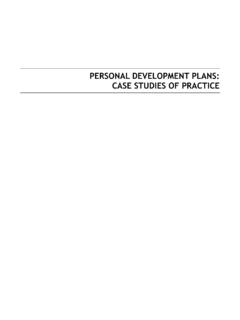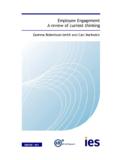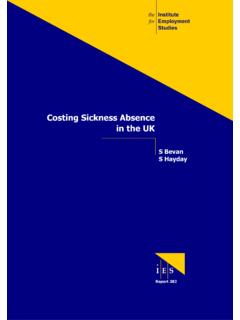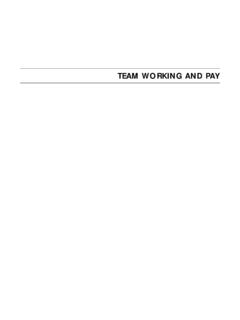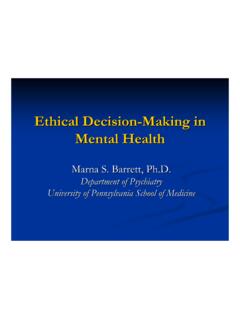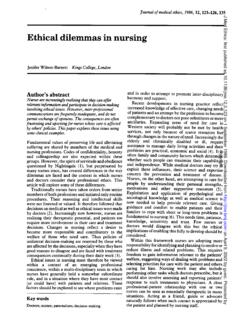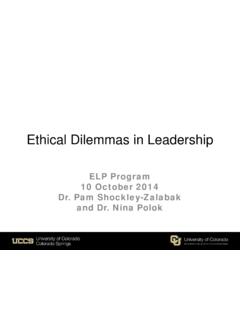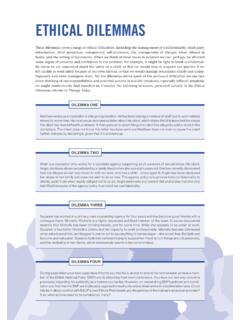Transcription of Ethical dilemmas in HR practice - Institute for Employment ...
1 Ethical dilemmas in HR practice A paper from HR in a disordered world: IES Perspectives on HR 2015 Alison Carter, Principal Associate Member Paper 111 Ethical dilemmas in HR practice Alison Carter, Principal Associate Why do we need to worry about ethics? A survey in 2013 by the Institute of Business Ethics found that 38 per cent of the British public believe that business behaviour is in general not Ethical . This is not surprising when every year there seems to be a new corporate failure or scandal in the headlines which raise serious questions about the way organisations are managed. Financially, it can be disastrous for organisations; negative views of investors can damage share prices, consumer disapproval can reduce sales and that is before any compensation claims and fines by the courts kick in. High profile examples include: Accusations of bribery by GlaxoSmithKline employees in China. Criminality at the News of the World. LIBOR fixing, PPI mis-selling and sub-prime mortgage lending in financial services followed by failure in investment banks to understand widespread public concern about a culture of large bonus payments.
2 Failure of governance at the UK s Mid-Staffordshire Hospital and lack of attention given to clinical care. Initial failure by BP to understand quickly public concerns in the US about environmental issues in the Gulf of Mexico and lack of priority given to equipment safety in dealings with subcontractors. To an outsider, it seems inconceivable that patient care wouldn t be at the core of an NHS organisation culture, or that companies involved in oil exploration wouldn t prioritise equipment safety. Yet these and other examples demonstrate that, in the face of competitive pressures or organisational change, leaders can become distracted from their ultimate responsibilities, corporate blind spots develop and company reputations suffer. 1 Institute for Employment Studies John Blakely and Ian Day wrote a provocative book in 2009 called Where Were All the Coaches When the Banks Went Down?, I am more interested in what the HR Directors of News of the World, Mid-Staffs Hospital, BP as well as the banks were doing before their companies were found out and their corporate reputation collapsed?
3 How was it that illegality or unethical practice went under the radar for so long? Didn t HR people notice questionable behaviour and a widespread inappropriate organisational culture or was it so endemic that HR Directors really thought everything was OK? Were they subject to the same corporate blind spots and group-think as others or did they feel uneasy but unable to step up and say what was wrong and what needed to be done to change? Time for HR to do some Continuing Professional Development (CPD) on ethics? Human Resource is a business function that is concerned with managing relations between groups of people. Inevitably, this process may raise questions about what the respective responsibilities and rights of each party are in this relationship, and about what constitutes Ethical practice . Standards, values, morals and ethics have become increasingly complex in a postmodern society where absolutes have given way to tolerance and ambiguity. All of us operating in the HR field might benefit from revisiting our early HR education on ethics and update it to include new questions.
4 I think it might be time for some CPD on ethics. Questions we might collectively consider include: What is the Ethical role of HR? If it is every employee s role to behave in line with company ethics and values and if managers are the keepers of the flame, then it can t be HR s role to implement Ethical practice can it? Should we instead be an early warning system, the canaries down the coal mine , or individual smoke detectors of Ethical fires that could erupt further down the line? Should our role be in engaging employees in the debate and promoting accountability? What role does HR play when things seem to be going well but we can t see the bad behaviour eg huge bonus payments, poor patient care Should HR be critiquing organisational culture/health as a matter of routine and being more pro-active in diagnosing problems and assessing Ethical risk? Does our culture promote Ethical conduct? Is there a pattern of problematic behaviour unfolding in specific areas and what are we doing about it?
5 How do we identify Ethical blind spots in our organisation s culture? What message does HR professionals own behaviour give? Our decisions affect people s working lives and future Employment . Are we leading by example in acting with integrity, openness and honesty? Are we role modelling the right behaviours of inclusion and acceptance of diversity and honesty? Ethical dilemmas in HR practice 2 Has the HR function s ambition to be seen as more strategic made us act too much like part of the business and too little like HR people? Poor standards of conduct emanating from top management affect employee engagement and commitment to organisational goals. Should HR intervene more? Should we listen more to concerned employees speaking up and support them rather than help managers in shutting them up? Are we as courageous and resilient as we need to be to challenge those at the top and say this is wrong ? Are we just too keen to fit in with our most senior colleagues?
6 Are we in HR clear what the practical implications are of living our organisation s values in terms of contracts, appraisals, bonuses, non-monetary benefits, speak-up mechanisms and development opportunities? Are we communicating these well and reinforcing the messages consistently? How are we evidencing practice in terms of ethics, integrity and honesty? Are we getting the whole story? Ethical conduct in business practice and HR procedures is no longer a matter of choice for UK companies: public pressure and consumer demand for sustainable and Ethical business has forced most companies to set standards, systems and processes for ethics and values. According to Professor Amanda Mellor (Group Secretary of Marks and Spencer plc.), at a recent conference on ethics in business: Developing standards and values frameworks are the easy part: it is how you engage employees in living up to organisation values in practice that is the leadership challenge . Mellor A (2014) Who is worried about what in terms of ethics?
7 Much of the media focus on questionable business ethics during 2013/2014 has been directed at corporate tax avoidance. Before that, speak-out mechanisms, sweat shop labour and aggressive treatment of competitors were in the news. But people management practices have also come to public attention directly and been branded as unethical: excessive executive pay, off-shoring and exploiting cheap labour markets; reneging on company pension agreements; unpaid internships and increasing work stress. Concern has surfaced from a variety of sources: from consumer groups; political groups; religious and charitable organisations. Entrepreneurs, academics, and professional bodies have all expressed the view that standards of behaviour within business need to be evaluated, and improved. Many issues of concern are common but the Ethical problems we see are shaped by who we are and our perspective on the world and organisations, as we can see in Table 1 below. 3 Institute for Employment Studies Table 1.
8 Most common areas of workplace conduct causing Ethical concern, through the different eyes of HR, employees and public HR specialists Employees General public Favouritism in hiring, training and promotion decisions Low trust in senior managers Corporate tax avoidance Inconsistency in disciplinary measures Lying to employees Executive pay and bonuses Failure to maintain confidentiality of customers or employees Pressure to compromise standards Employees being able to speak out Potential discrimination in appraisals and in allocating pay/non-pay reward Failure to discipline or punish bad or abusive behaviour Bribery and corruption Maintaining a safe and healthy work environment Retaliation against those reporting misconduct Discrimination Subcontractor conduct within outsourcing and off-shoring Bad behaviour by managers setting a poor example for everyone else Environmental responsibility Harassment and bullying Corruption Harassment/bullying Generation stereotyping Sweatshop labour Fair and open pricing of products and services Source.
9 IES, 2015 (adapted from UK and US surveys 1991/2013) What Table 1 highlights (in discussions at IES Annual Members Conference, 2014; Danley, Harrick, Strickland and Sullivan, 1991), is that what we see as Ethical issues is shaped by who we are and our perspective on the world of work. There is potentially a dark side to this in that the same process can leave us with blind spots where we have an inability or an unwillingness to see the potential Ethical problem looming. We may inadvertently support or turn a blind eye to behaviour that others have deep concerns about and which may come back to bite us. Shouldn t HR be interested in and responding to some of these issues that are highly visible to employees or the general public? It may not be that HR itself is unethical but it can get its Ethical knickers in a twist over different things. I believe it is time for HR to not only respond to those things which are its natural territory, but also expand its perspective and broaden its Ethical awareness and sensitivity.
10 dilemmas in people management practice A good way to think about ethics in HR is to consider some contemporary real-life dilemmas faced by HR specialists. HR specialists face dilemmas all the time but I am particularly thinking about the ones involving questionable management behaviour. Some straightforward situations are listed below. Try reading each dilemma in turn and ask yourself: Ethical dilemmas in HR practice 4 Are there any Ethical problems here? What is the full range of possible solutions available? Which solution would you choose and why? Would you behave differently if you knew for certain no one would ever find out? After that, I suggest you reflect on all the scenarios as a whole. Consider which you found easiest to answer and which the hardest? What does that tell you about your approach to HR ethics and/or the culture of your organisation? Role conflict You operate as a trained internal coach on top of your HR manager day job.
